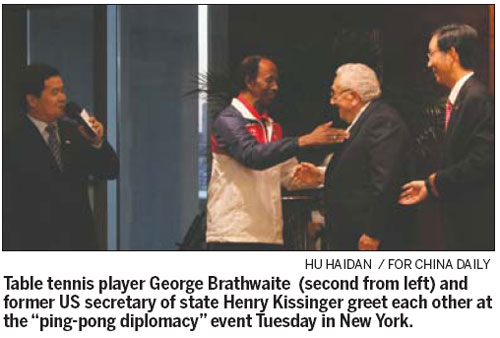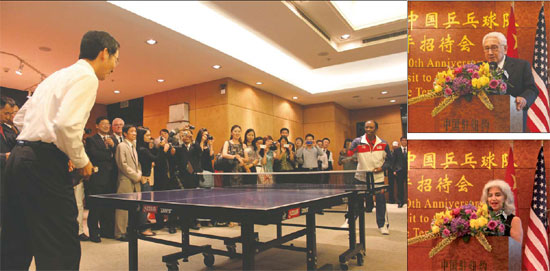Ping-pong's power saluted 40 years on
Updated: 2012-08-31 11:31
By Chen Weihua and Liu Yuhan in New York (China Daily)
|
||||||||
|
Sun Guoxiang (left), China's consul general in New York, plays a game against George Brathwaite, a member of the US Table Tennis Team that visited China in 1971. Speakers at Tuesday's commemoration of "ping-pong diplomacy" included former US secretary of state Henry Kissinger (top right photo) and Jan Berris (bottom right photo), vice-president of the National Committee on United States-China Relations. Kissinger disavowed any official US role in arranging the team's visit 41 years ago. Photos by Hu Haidan / For China Daily |
A game of table tennis in New York between a senior Chinese diplomat and a famed American player was about more than quick reflexes and spin strategies - though there were plenty of both to delight the spectators on hand.
As Sun Guoxiang and George Brathwaite chopped and smashed their way through their Tuesday evening game in China's consulate general overlooking the Hudson River in Manhattan, the legacy of "ping-pong diplomacy" for US-Chinese relations was on most everyone's mind.
Brathwaite was a member of the US Table Tennis Team in April 1971 when it became the first American sports delegation to visit China since the 1949 founding of the People's Republic. The trip was a step toward normalizing the two countries' then-strained relations.
Over the years, various stories have emerged about how the US team got invited. One that's frequently told involves American player Glenn Cowan, who had been practicing with China's Liang Geliang in Nagoya, Japan, at the 1971 World Table Tennis Championship.
When Cowan missed his team bus, he got a ride with the Chinese team. Zhuang Zedong, a three-time world champion, greeted Cowan and even gave him a gift - a silk-screened portrait of the Huangshan Mountains in eastern China.
"Of course," Cowan said when asked by reporters if he would like to visit China. The trip was on.
Henry Kissinger, who as US secretary of state enjoyed at least some residual benefit from "ping-pong diplomacy" during President Richard Nixon's historic visit to China in February 1972, shed new light on the matter at Tuesday's commemoration.
Kissinger, who is now 89, said the US government had nothing to do with the table tennis team's visit.
"We are often given credit for it, which is totally undeserved," he said, adding that Chinese officials found it hard to believe that such a trip could happen without the approval of official Washington.
Several times, Kissinger mentioned that the Nixon administration was concerned that the team's visit could jeopardize back-channel communications with China. Kissinger made a secret trip to the country in July 1971, three months after the table tennis team was there, to set the stage for Nixon's own visit the following year.
Kissinger recalled what the Chinese officials later told him. After receiving a recommendation from China's foreign ministry that the team's visit be allowed, Chairman Mao Zedong looked at the document, took sleeping pills and went to bed. He woke up in the middle of the night and called an aide. Mao said he wanted to answer the American request now and wanted the cable sent immediately. "We in the US government absolutely had no relationship with it," Kissinger repeated.
Jan Berris, vice-president of the National Committee on United States-China Relations, said she was about to board the Star Ferry in Hong Kong when she spotted on a newsstand a banner headline announcing an American ping-pong team's visit to China. She assumed it was an instance of a Hong Kong paper using a sensational headline.
"To my amazement, I got to the consulate and find out that the story was actually true," said Berris, who at the time was a young US Foreign Service officer stationed in Hong Kong.
Little did she know that seven months later she would be involved in the second phase of "ping-pong diplomacy", taking a year off from the Foreign Service to prepare for a reciprocal visit by China's national table tennis team. That one-year sabbatical became permanent and led Berris to the US-China committee, where she has worked for the past 41 years.
That secret visit by Kissinger changed the diplomatic equation and brought many exciting opportunities, Berris said. "Actually, I have to thank Dr Kissinger for helping me to make my decision, the best decision I have made in my life," she said.
For Brathwaite, meeting Chinese Premier Zhou Enlai was a major highlight of the team's trip. Of the photo he keeps of him shaking hands with Zhou, the player said, "I will cherish it for the rest of my life."
"In many respects, when politics has fallen short, sports have succeeded," Brathwaite added.
"The exchange of visits of the Chinese and US table tennis teams signified that a small ping-pong ball can move the big globe ahead," said Sun, China's consul general in New York.
"During a time that our relationship is not as good as we all hope it could be and should be, I think the challenge is for all of us to revive that enthusiasm and optimism that the visits of the two ping-pong teams brought us," said Berris.
Contact the writer atchenweihua@chinadailyusa.com


 Relief reaches isolated village
Relief reaches isolated village
 Rainfall poses new threats to quake-hit region
Rainfall poses new threats to quake-hit region
 Funerals begin for Boston bombing victims
Funerals begin for Boston bombing victims
 Quake takeaway from China's Air Force
Quake takeaway from China's Air Force
 Obama celebrates young inventors at science fair
Obama celebrates young inventors at science fair
 Earth Day marked around the world
Earth Day marked around the world
 Volunteer team helping students find sense of normalcy
Volunteer team helping students find sense of normalcy
 Ethnic groups quick to join rescue efforts
Ethnic groups quick to join rescue efforts
Most Viewed
Editor's Picks

|

|

|

|

|

|
Today's Top News
Health new priority for quake zone
Xi meets US top military officer
Japan's boats driven out of Diaoyu
China mulls online shopping legislation
Bird flu death toll rises to 22
Putin appoints new ambassador to China
Japanese ships blocked from Diaoyu Islands
Inspired by Guan, more Chinese pick up golf
US Weekly

|

|







